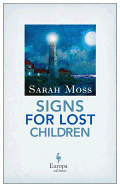
In Victorian England, women are beginning to qualify as medical doctors. Ally Moberly is among this rare group, but respect doesn't accompany her role, especially when she pursues an interest in those institutionalized for madness, the lowliest branch of medicine. She contemplates herself through the logic of the period, "An unnatural, undomesticated being, very probably subject to mental instability herself, for why else would a woman declare herself unsatisfied by her own family life and seek to usurp the masculine role?" So she is resigned to a life of spinsterhood in exchange for her career, until she meets Tom, a young engineer for an innovative company. Not long after their wedding, he travels to Japan to oversee the construction of lighthouses. His long absence creates space for the couple to grow in independent directions, leaving them with new challenges upon his return.
While Sarah Moss (Bodies of Light) explores the nature of marriage through Ally and Tom, the real draw to Signs for Lost Children is her probing journey through the Victorian view of insanity and the dawning of feminism. Ally's traumatic personal experiences with her mother, as well as her intellect, give her a deep understanding that eludes most men in the medical field at the time. She's well developed as a character, eliciting empathy and encouraging readers to connect with her. Tom's character is also strong, but Ally simply dominates the novel. Readers will enthusiastically delve into her life and root for her to succeed. --Jen Forbus, freelancer

